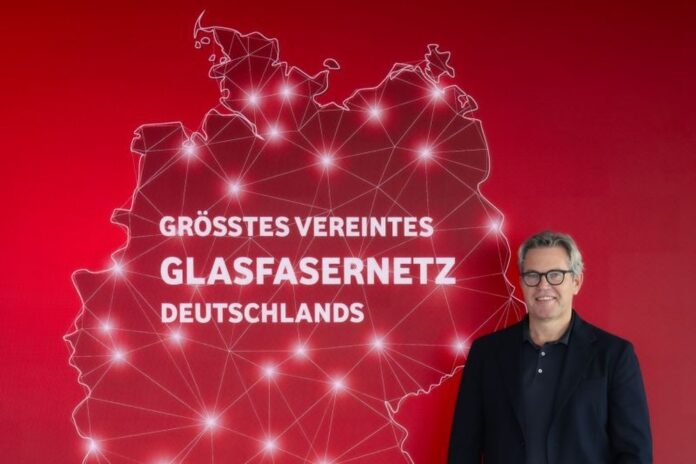No mean feat, but shareholders are more interested in when Vodafone Group’s largest market will finally pull its weight on the balance sheet
Marcel de Groot, CEO of Vodafone Germany (pictured above), took to LinkedIn today to announce the operator is “connecting the largest unified fibre optic network” in the country. [All quoted comments below are translated from German].
He said that due to this latest phase of its fibre expansion, in future Vodafone will be able to offer fibre broadband to 11 million more customers – the “broadest offer in the market”. De Groot added that the operator had achieved this by merging several infrastructures, building interfaces and standardising booking processes for customers.”
He says that now the company is focused on two things: expanding its fibre coverage and sharing infrastructure with Deutsche Telekom, Deutsche Glasfaser Unternehmensgruppe and others. The plan is, he says, that, “We stimulate competition in the market. Germany’s internet users can choose between more offers.”
De Groot continues, “Not having a superstructure saves enormous resources and enables attractive pricing”.
Long and winding road
It’s been a long, tough road for Vodafone in Germany, particularly on the fixed-line side. Poor performance in this, Vodafone’s biggest market, has been a drag on the group’s earnings reports for too many quarters. It has looked indecisive and ill-prepared at times. For instance, in April 2022, Vodafone Germany announced it would replace CEO, Hannes Ametsreiter, with former Microsoft exec Philippe Rogge.
This was particularly surprising given that the operator had confirmed Ametsreiter’s tenure as CEO for a further three years just the month before. His successor was not to be in office long.
Vodafone made a dramatic entry into Germany’s fixed market by controversially acquired Liberty Global’s cable TV infrastructure in 2019 for €18.4 billion, along with those in the Czech Republic, Hungary and Romania.
Many commentators thought it had paid a lot too much. Deutsche Telekom, TV content providers and other network operators argued that the European Commission’s anti-competitive remedies didn’t go far enough.
Vodafone said at the time the deal went through, in August 2019, that it made Vodafone Deutschland into Europe’s biggest “converged” operator, with 54 million on-net cable and fibre households and an overall “next-generation network reach” of 124 million homes and businesses.
Change in the law
In the event, a fall-out from a change in the law hit Vodafone perhaps surprisingly hard, given it had plenty of warning. Liberty Global had provided almost every multi-tenanted dwelling in Germany with cable TV and internet access.
The changed law allowed households within multi-tenanted dwellings to choose their own internet provider, rather than have to stick with their building’s incumbent. Rogge resigned and left at the end of March. The change came into force on 1 July. De Groot, head of Consumer at Voda Deutschland since 2022, stepped into the breach.
At the same time, Ahmed Essam, formerly CEO of Vodafone UK, was appointed CEO European markets and Executive Chair of Germany at Vodafone Group. DeGroot reports to him, and in turn Essam reports to Group CEO, Margherita Della Valle. Clearly the group wanted to usher in a new era, but it has some way to go.
In the Q1 earning report for the 2025 financial year, Vodafone Deutschland reported service revenues down by 1.5%, 1.2% of which was attributed to the change to multi-dwelling units. Other factors include churn from broadband price hikes last year. The operator has secured the retention of 2.6 million multi-tenant households but is bracing itself for what it calls “the next big ‘wave’ of tenants transitioning in Q2”.
Accentuate the positive
Naturally de Groot’s LinkedIn post today accentuates the positive, saying that in 2019 Vodafone launched “the largest Gigabit network in Germany”.
By October 2020, the company announced it had completed the upgrade of the cable infrastructure to fibre in 13 federal states which it called “the largest gigabit expansion project in Germany”. The operator said it had added another 730,000 connections, meaning that around 12.6 million cable households have gigabit access to the Internet.
Now on LinkedIn, de Groot states, “[Gigabit fibre] is now available to 24 million households. Starting today, we will bring even more fibre to our customers. This is a good step forward for us, for many millions of Internet users and above all for fixed-line competition in Germany.”
It will be interesting to see if Vodafone Deutschland can finally pull what should be its considerable weight on Vodafone Group’s balance sheet.



